
Decision will affect hundreds of not-criminally-responsible accused stuck in hospital, says lawyer

A recent decision from the Ontario Court of Appeal will impact hundreds of not-criminally-responsible accused who are currently caught in limbo because of hospital and housing-provider COVID restrictions, says Anita Szigeti, a litigator with a practice focussed on mental health and the law.
On Feb. 12, in overturning an Ontario Review Board order and substituting its own judgment, the Court granted a conditional discharge to Jerome Williams, who was being detained in a psychiatric hospital because COVID-related policies prevented the hospital from assessing and executing alternative living arrangements.
“This is going to have broad significance for people within the Review Board system, because right now people are stuck… because the review board is washing its hands of these accused and deferring to hospital policies around COVID,” says Szigeti, who acted for Williams along with co-counsel Maya Kotob. “The Court of Appeal has now said that the Board has an obligation to do more.”
"The Court in this case is reinforcing its earlier direction to the Review Board, which it would appear requires emphasis and further guidance now to the Board,” says Kotob. “Specifically, the Court is cautioning the Board that it cannot prioritize convenience and expediency for the hospital over the liberty interest of the accused person and their right to the least restrictions on their liberty.”
Overturning the ORB and substituting its own judgment is “rare and uncommon” for the Courts because of the “significant deference” they owe expert tribunals such as the ORB, says Szigeti. But Friday’s is the third such ruling since last September, she says. In November, the Superior Court rejected an ORB decision that an NCR accused attend an annual review by videoconference, without the consent of the accused, because of COVID. And in September’s decision in Sim (Re), 2020 ONCA 563, the Court of Appeal gave a man the absolute discharge the ORB had rejected, finding the Board had focused “almost exclusively” on evidence supporting his continued detention, while providing “virtually no analysis” on evidence supporting his discharge, wrote Ryan Clements in CanLII Connects.
Jerome Williams was found not criminally responsible on account of a mental disorder after being charged with a number of offences in December 2011. He is now 33 years old and has been under the charge of the ORB since January 2012. When first admitted to the Centre for Addiction and Mental Health Williams was in a psychotic state, but once medicated, recovered from his symptoms.
In January 2019, Williams was discharged into the community to live with a romantic partner, who shortly thereafter gave birth to their child. But by the end of the year, Williams had readmitted himself to CAMH because the relationship had ended.
Then, COVID hit. Because of hospital policies and restrictions, Williams lost his indirectly supervised and community privileges and was not allowed visitors, preventing him from seeing his son and his mother. In May, Williams sought to be released into the community, to stay at either his mother’s or a friend’s house.
The hospital was only willing to release Williams to a place equipped with supportive services, but its choice was not accepting new patients because of COVID. Williams was left without options because the hospital also ceased conducting assessments for alternative living arrangements due to the virus.
The hospital rejected Williams’ request for a conditional discharge, reasoning that if he stopped taking his medication and his mental health declined, the hospital would not be able to react quickly enough in bringing him back. The ORB accepted the hospital’s position. This decision was unreasonable and contained “significant errors,” said the Court of Appeal.
While the ORB said Williams’ stay in the community was unsuccessful, the evidence showed the only problem was his break-up, after which he went straight back to the hospital. The ORB did not inquire as to why the hospital was not conducting housing assessments because of COVID, nor when they would resume, which neglected its responsibility “to search out and consider evidence favouring” Williams’ “absolute discharge or release subject to the minimal necessary restraints,” said the Court.
The Court was also “troubled by the attitude” the ORB showed the offers Williams made for potential housing. The Board described the offers, which were short, handwritten notes, as “presented in a very rudimentary and unprofessional format.” The Court called this characterization unfair and a failure to consider the restrictions COVID has placed on individuals, while simultaneously accepting the restrictions the hospital had relied upon.
The Court allowed Williams’ appeal and replaced the ORB’s disposition with a discharge on the conditions that William reside with his friend, report to his clinical team, abstain from recreational drugs, provide urine samples, take his medication, return to the hospital if summoned and notify the Board of any change of address.